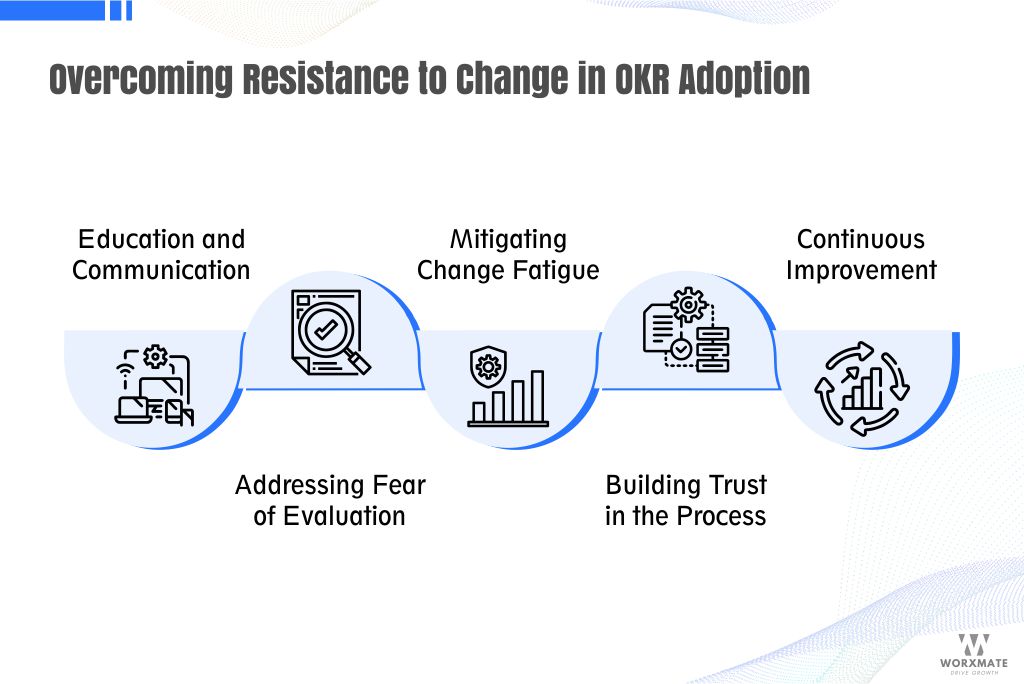
Conquering Resistance to Change in OKR Adoption: A Comprehensive Guide
Modification is frequently met resistance and introducing Objectives and Key Results (OKRs) to a company is no exception. Whether it's worry of the unknown, concerns about included work, or hesitation about the efficiency, dealing with resistance is a vital element of successful OKR adoption. This detailed guide aims to browse the intricacies of resistance, providing insights and actionable methods to pave the way for a smooth and effective integration of OKRs within your organization.
Comprehending the Roots of Resistance
Before addressing resistance to OKRs, it's important to look into the roots of this resistance. Employees might resist change due to different aspects, such as a fear of the unknown, issues about job security, or a lack of comprehending about how OKRs will impact their roles. It is essential to carry out comprehensive communication and education campaigns, using transparency about the reasons behind the adoption of OKRs. Furthermore, assisting in open online forums for employees to reveal their issues and supplying clear, detailed information about how OKRs will benefit both individuals and the organization can help in taking apart the skepticism. By understanding the specific factors behind resistance, companies can customize their technique, fostering a more inclusive and collaborative environment that sets the stage for successful OKR adoption. Recognizing and dealing with these source is a basic step in building a structure for modification that is rooted in transparency, trust, and shared understanding amongst all stakeholders.
Building a Coalition of Champions
For OKR adoption to be reliable, building a coalition of champions is essential. Identify and support those early adopters and change advocates within the organization. These champions must deeply comprehend OKRs and be passionate about their advantages. Empower them to share their favorable experiences, serve as coaches to others, and supply continuous assistance. An example of an effective union could be seen in an innovation business that selected OKR ambassadors from numerous departments. Through their interest and know-how, these ambassadors assisted in a smoother shift and motivated their peers to welcome the modification, leading to prevalent OKR adoption and enhanced organizational efficiency.
Tailoring the OKR Framework to Fit the Organization
While OKRs use a structured technique to goal-setting, modification is important to line up the structure with an organization's distinct needs and culture. This involves tailoring the language used in goals and key outcomes to resonate with the company's vocabulary. For instance, if a business values innovation, incorporating language that reflects a dedication to groundbreaking options can boost engagement. Furthermore, the frequency of OKR updates and reviews must be adapted to suit the organization's pace. Some business might prosper on quarterly OKR cycles, while others choose a more agile approach with shorter amount of time. By tailoring the OKR structure, organizations ensure that it becomes an important part of their DNA, fostering higher approval and effectiveness in driving performance.
Supplying Comprehensive Training and Support
It is vital to make investments in comprehensive training programs that inform staff members of the OKRs' assisting concepts and allay their concerns and worries in order to get rid of resistance. By fostering a deep understanding of how OKRs line up with organizational objectives and individual roles, employees are most likely to accept the change favorably. Additionally, offering ongoing assistance and developing a collaborative environment where questions are motivated can assist build trust in the OKR procedure. This method enhances employee engagement and ensures a smoother shift towards a more goal-oriented and performance-driven organizational culture.
Fostering a Culture of Continuous Improvement
When employees see the tangible benefits and effective results of implementing OKRs, their resistance to alter normally wanes. Developing a culture that places a premium on continuous improvement and acknowledges even incremental successes is vital in strengthening the positive effect of OKRs. When employees see that their efforts contribute to meaningful accomplishments and align with the company's objectives, it fosters a sense of purpose and ownership.
Regular and transparent communication plays an essential role in this procedure. Leaders ought to consistently highlight and commemorate the accomplishments assisted in by OKRs, highlighting the direct correlation in between the framework and organizational success. By showcasing how OKRs have actually resulted in concrete, positive outcomes, employees become most likely to embrace the modification, understanding its worth in driving continuous enhancement and adding to the organization's general success. This communication strategy assists bridge the gap between preliminary suspicion and a shared understanding of how OKRs favorably influence individual and cumulative success.
Reframing Resistance as an Opportunity for Growth in OKR Adoption
Resistance to change, specifically when introducing Objectives and Key Results (OKRs), can be reframed as a chance for growth within a company. Rather than seeing resistance as a hurdle, consider it a driver for transformation and enhancement. When employees express issues or reservations about OKRs, it enables open dialogue, addresses misunderstandings, and fosters a deeper understanding of the framework.
Leadership can take this opportunity to engage with employees, obtain feedback, and collaboratively refine the OKR procedure. By reframing resistance as a positive force for growth, companies can cultivate a culture of continuous enhancement, where challenges become stepping stones towards achieving shared goals and fostering a more resilient and adaptable labor force. Embracing resistance as a chance highlights the dynamic nature of modification and positions the organization for improved dexterity and success in the long run.
Conclusion
In the journey towards OKR adoption, overcoming resistance is a critical step. By comprehending the sources of resistance, building a network of champions, customizing the structure, supplying detailed training, and fostering a culture of constant enhancement, organizations can not just browse through resistance but also lay the structure for a successful and sustainable OKR application. OKR Adoption Keep in mind, the goal is to adopt OKRs and influence favorable and enduring change within the organizational fabric.
Article Tags: OKR Adoption, OKR Failure, OKR Case Studies, OKR Consulting, OKR Challenges.